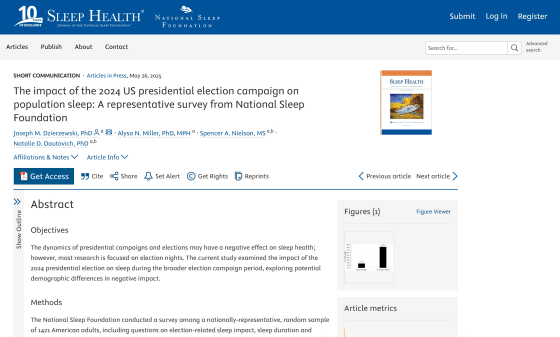Survey finds major elections could negatively impact people's sleep

In the lead-up to major national elections or on election day, many people find themselves worrying about whether their favorite candidate will win or which party is in the lead, cutting back on their sleep and bingeing on the news. In fact, a study conducted during the 2024 US presidential election showed that elections may have a negative impact on people's sleep.
The impact of the 2024 US presidential election campaign on population sleep: A representative survey from National Sleep Foundation - Sleep Health: Journal of the National Sleep Foundation

Study: 2024 presidential campaign negatively affected sleep for 17% of US adults
https://www.psypost.org/study-2024-presidential-campaign-negatively-affected-sleep-for-17-of-us-adults/
Previous research has shown that people's sleep patterns can be disrupted on election night, but little research has examined the relationship between sleep and the election period, when the campaign and candidates' messages dominate media coverage.
According to a 2023 survey by the Pew Research Center, two-thirds of American adults feel exhausted by political debate, and more than half say they frequently feel angry. The stress of political events can build up over time and disrupt people's sleep.
Researchers at the National Sleep Foundation in the United States conducted a nationwide online survey in collaboration with market research company Ipsos Public Affairs to find out how the protracted US presidential election has affected people's sleep.
The survey was conducted among 1,421 adults living in the United States between September 19 and 30, 2024, approximately six weeks before the US presidential election. Respondents were randomly selected based on their residential address to reflect the overall US population, and Black and Hispanic people were intentionally overrepresented to allow for comparisons between groups.
Respondents were asked to rate their sleep quality on a five-point scale from 'very good' to 'very poor,' and also whether they felt the 2024 presidential election had a negative impact on their sleep. The researchers removed problematic responses and used a sample of 1,364 responses, weighted to match demographics with the U.S. Census data.

The analysis revealed that 17% of respondents said that the 2024 presidential election had a negative impact on their sleep. While this is not a large percentage, given that the US population is approximately 340 million, this means that the election had a negative impact on the sleep of tens of millions of people.
Those who reported negative impacts on their sleep tended to sleep less on weekends and rated their sleep quality as poorer. Those who reported that the election had a negative impact on their sleep averaged 6.98 hours of sleep over the weekend, while those who reported that the election had no impact on their sleep averaged 7.41 hours. Differences also emerged on the sleep quality scale: those who were negatively affected by the election scored an average of 3.05 out of 5, compared with 3.36 for those who were not negatively affected.
The study also found demographic differences in the impact of the election on sleep. Those reporting a negative impact on their sleep were more likely to be older than younger people, to be non-Hispanic, and to be classified as 'other' (Asian, Native American, or multiracial). Hispanic adults, on the other hand, were less likely to report a negative impact on their sleep.
Employment status and household composition also correlated with the results. Full-time workers and the unemployed were more likely to report negative effects of the election on their sleep than part-time workers, and childless households were more likely to report a stronger impact than those with children. This was somewhat surprising, given that childcare generally leads to sleep disruptions.
However, factors such as political affiliation, gender, marital status, and education level were not found to be associated with the negative impact of elections on sleep. While these factors are generally thought to be related to voter ideology, this suggests that election stress has an impact across these categories.

The study relied on self-reporting, which could be subject to memory errors and bias. It also didn't investigate how much stress individuals felt about the election campaign.
PsyPost, a psychology media outlet, said, 'Future research could examine how psychological characteristics such as anxiety sensitivity, emotional reactivity, and media consumption habits moderate the impact of political events on sleep. It might also be useful to analyze whether messaging strategies used during campaigns, such as those that emphasize threats or incite anger, are more likely to disrupt sleep.'
Related Posts:
in Science, Posted by log1h_ik







